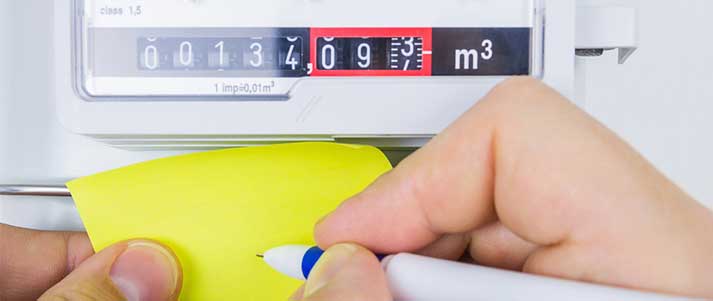17 energy saving tips to save money on bills
With energy costs at an all-time high, it's becoming even more difficult to cover your bills with your Student Loan. But we're here to show you how to save gas and electricity.

Credit: (left) azazello photo studio, (right) RTimages – Shutterstock
With or without a cost of living crisis, it always makes sense to keep an eye on how much energy you're using.
In the National Student Accommodation Survey 2024, surveyed students spent an average of £86 per month on energy bills. Though this has only seen a small increase since the 2023 survey, it's still £24 higher than the average of £62 per month reported back in 2022.
Hopefully, with our energy-saving tips below, you can cut down your usage. This will help you save some money on your energy bills and will have the added benefit of reducing your carbon footprint.
How to reduce your electric and gas bills
These are the best ways to save money on your energy bills:
-
Turn down your thermostat and wrap up warm

We'll get this energy-saving tip out of the way first since you've probably heard it more times than you can count.
It can be tempting to turn up the heating when it gets cold, but take a second to work out if you'd be more comfortable with an extra layer or two on. Even reducing your heating by as little as 1ºC can potentially cut your annual bills by over £100.
For those who really tend to feel the cold, you could get some seriously cosy slippers (we recommend some boot slippers, as these are extra warm), as your feet are more sensitive to temperature variations. Oh, and grab yourself a hot water bottle too.
-
Use an electric blanket instead of central heating
As well as cosy slippers and a hot water bottle, buying an electric blanket can be a good way to use less energy.
Rather than heating up the whole house, using a heated blanket helps you stay warm in your room. And since heated blankets are very energy efficient, you'll be using less energy than you would if you turned up the radiators.
During the cost of living crisis, it could make a big difference to your energy bills.
There are different types of electric blankets, including:
- Under-blankets – You can use these to heat up the surface of your bed
- Over-blankets – These can be used under or instead of your duvet
- Heated throws – These are perfect to use on the sofa or as an extra layer in bed, but they tend to be a bit pricier.
See our full guide to getting cheap electric blankets for more info, including how to use them safely.
-
Turn radiators down in rooms you're not using
Electric blankets are a great way to keep yourself warm. But whether it's to dry your washing, prevent damp emerging on the walls, or simply keep the house at a habitable temperature, sometimes you have no choice but to use the radiators.
When the time comes, consider adjusting the radiators in each room depending on how warm you need them to be.
For instance, if you're all sat together in the living room, you could have that radiator on a high setting and the others in the house turned down (or even off).
Or, if you have the heating on first thing in the morning to warm up your room, you could turn down the radiators elsewhere in the house before you go to bed. That way, you're paying less to heat the rooms you're not using.
To adjust gas radiators, there should be a dial on one of the corners that can be turned to whatever level you want. If you have electric radiators, there may be some buttons to use or even a screen.
-
Charge electrical devices at the library for free
As handy as the library is for reading books and going on your phone while you're trying to revise, it's also a great place to use some free electricity.
Before you head home for the night, make sure you charge everything you own: your phone, your iPad, your laptop, your... well, you get the picture.
It's also pretty good for your academic performance to be hanging around the library (provided you actually work while you're there). Plus, you can avoid any arguments with flatmates about having the heating on.
Check out our guide to how much electrical appliances cost to run. -
Try passive cooking
Passive cooking is simple: heat your food in boiling water for a couple of minutes, turn off the hob and put the lid on. The pan and the water will retain their heat, so it should still be warm enough for your food to continue cooking for a few more minutes.
The exact timings for actively and passively cooking your food will vary depending on what you're making and what kind of cooker you have.
For example, electric hobs remain hot long after you've turned them off, whereas gas hobs cool down very quickly. Similarly, different foods take different lengths of time to cook.
Pasta aficionados, Barilla, has a guide to passively cooking pasta. It even breaks things down by shape, with spaghetti supposedly needing two minutes on the heat plus eight minutes of passive cooking. This is only fractionally longer than the nine minutes recommended for traditional cooking, but it should use far less energy.
For other foods, it's worth checking on Google to see what people recommend. You may get away with just a minute or so of active cooking for vegetables like broccoli or peas!
-
Always submit meter readings

Credit: Yevhen Prozhyrko – Shutterstock
You'd never let the cashier at the supermarket guess how much your shopping is going to cost, so don't let the energy companies do the same for your bills.
It will take less than two minutes to check the readings of your gas and electricity meters and give them to your energy company. Make sure to do this every month to ensure you only pay for what you use.
Even if they're underestimating your usage, it's worth giving them the actual readings.
Eventually, they'll find out how much you're actually using (either when someone comes round to check the meter, or when you provide the mandatory readings when you move out), and you'll have to pay up then. Save yourself the fright of a massive lump-sum payment by paying what you owe, when you owe it.
Better still, by the end of 2025, all energy providers should have offered all customers a smart meter. These will give them a running update of your usage, meaning there are no estimates and no meter readings required. Contact your energy company to see if they'll provide you with one (if they haven't already).
And while we're talking about meters...
-
Pay your energy bills via Direct Debit
A lot of energy companies will give you the option of paying your bills via a fixed monthly fee Direct Debit. This can be great as it enables you to budget accordingly.
This option is different from a guesstimate. Instead, you agree on a fixed monthly rate which means you don't have to worry about bills fluctuating. More often than not, you'll get a better rate this way.
While you might end up paying slightly over what you use during the summer, you'll save this back in the winter when you're using slightly more energy than you're paying for. Unless you withdraw it, the extra money you paid in the summer will remain in your account as credit, so you don't have to worry about a thing.
It's still worth supplying your energy company with meter readings to ensure your Direct Debit isn't too low. You don't want to be left with a hefty payment to make at the end of your contract. -
Look for better deals on comparison websites and switch
Even in rented accommodation, you can easily switch energy providers.
Due to the energy price cap, the majority of energy providers are currently charging similar prices – making it difficult to find much better deals. However, there may be some fixed-rate deals around that are worth checking.
Doing a bit of research and comparing the current deals can end up saving you a lot of money over the year.
Octopus Energy is one to check out. They have tariffs below the price cap and you can get £50 in credit when signing up through our link.
-
Use a dishwasher instead of washing up

Credit: nadia_if – Shutterstock
There aren't enough win-win situations in life, but this is one of the few. Using a dishwasher actually uses less energy than washing up. It won't just save you money, but the hassle of manually washing dishes too.
Washing dishes by hand doesn't just use hot water when you fill the bowl. It also requires a near-constant stream of water to rinse each and every dish.
However, there are a couple of conditions to a dishwasher being the cheaper option. For one, the dishwasher must be full (or close to full). Otherwise, you're using just as much water for fewer dishes.
What's more, heavily soiled dishes should probably be hand-washed anyway, as dishwashers tend to struggle with them. Even on the highest setting (which is usually the most expensive), some chunks of food or grease won't budge.
But in the majority of cases, if you've got a dishwasher in your student house, you'll save money by filling it up and avoiding washing it by hand.
Using a dishwasher is one of our top ways to save on your water bill. -
Take shorter showers
When the weather outside is frightful, a hot shower can be so delightful. But don't spend too long in there – showers can be a lot more expensive than you might think...
As we explain in our guide to how much energy costs, showers are comfortably one of the most expensive things to use in your home.
According to our calculations*, a single person having one 10-minute shower a day could add over £12 to your monthly energy bill. In a house of four people, that's suddenly around £50 on your bill just from showers.
The good news is that experts say you should only be showering for about five minutes, or a little longer if you're washing your hair. So, follow this advice and you could end up making a serious dent in your energy bill.
* Actual figures will vary depending on whether or not you have an electric shower, and how hot you have the water.
-
Use energy-efficient appliances
Chances are you've probably seen things on sale with energy ratings. But have you ever actually let them influence your purchases? Well, you should!
Products receive a ranking from A++ all the way down to G. It's worth bearing in mind the money you could save on bills by going further up the alphabet.
While an A++ piece of kit is likely to cost more, it'll save you a lot of money in energy bills later on down the line. For example, did you know that switching a 50-watt halogen bulb to an LED could save you £4 per bulb per year?
As for leaving things on standby, you could invest in an energy-saving plug. These save you the hassle of switching things off at the wall by automatically doing it for you when it's safe to do so. Then, when you turn the device back on, just press the power button on the remote as normal.
-
Wash your clothes at a low temperature
You've probably heard your parents going on about washing whites and colours separately. But while we don't want you to end up with pink shirts, if you wash at 30ºC and use a colour catcher you should be fine.
If you (and your flatmates, if you're comfortable washing your clothes with theirs) have enough whites to make up a full load you can still wash this at 30°C. Nowadays, detergents work just as well at lower temperatures.
We all know how annoying it is when your favourite shirt is in need of a good scrub before a night out. But the point is, you should never use the washing machine for a single item and never put on a half load. Either wait until you have enough laundry to make up a full load, or share with your flatmates.
You can also avoid using the tumble drier. They cost a lot to run. Instead, a simple airer will dry your things just as well, and there's no risk of shrinking your clothes. However, if you still want to tumble dry your clothes, use tumble drier balls which help reduce drying time.
-
Use bubble wrap as insulation

You'll obviously be limited in what you can do to insulate a rented property, but there are some little tricks you can use to keep your place warm and draught-proof.
For example, if you have single-glazed windows, try taping some bubble wrap across the window. This might sound weird, and look even weirder, but you'll still get daylight shining through the bubble wrap. It does make a big difference (if you like looking out of the window, save this method for the really cold winter nights).
Even little things like using a draft excluder at the bottom of any external doors to save energy can make a big difference.
-
Defrost your freezer
Does your freezer have a thick layer of ice stuck to all sides? To keep all that ice from melting, your freezer has to work a lot harder. And doing so can use a lot of extra electricity. Regularly defrosting your freezer can help you save a lot of money.
To save even more energy, you also want to ensure that your freezer is well-stocked. This may sound counterintuitive after we just told you to get rid of the ice building up inside your freezer. However, growing ice on the sides requires a lot more energy than keeping food inside cool.
Plus, when you open your freezer all the cold air comes rushing out. This means that when you close it, it'll use more energy to stay cool. Having your freezer filled with food will allow less warm air to enter, which then has to be cooled down again.
If you can't afford to fill it with frozen food, you can add bags of ice cubes or bottles of water to keep the cold air in. It's best to put these at the back of the freezer though, so you can quickly get to the food you use. This way, you don't have to open the freezer door for too long.
-
Get an idea of how much energy your flatmates use
We're not suggesting that you should hide around the house and watch your flatmates like a hawk – you don't want to be one of those annoying housemates. But if they're always leaving the lights on, or overusing an electric heater in their room, make sure you speak up about it.
Especially with energy prices being so high, it's not fair if one person pushes up the energy bills for the rest of you.
-
Make sure 'extras' pay their share of bills
It happens far too often: one flatmate gets a significant other, and then all of a sudden it feels like the house has acquired a new flatmate.
Aside from never being able to sit on your own sofa, they're also pushing up your bills.
Don't feel like you're being rude by asking them to pay their way. If they're there more than three nights a week, they should ideally be chipping in.
-
Make your home more energy-efficient

Credit: John Seb Barber - Flickr
Aside from making sure all your windows and doors are shut tight, it's generally a case of just trying to use less. You'd be surprised at how much even a small reduction can save.
Turn the lights off when you're out of the room, only boil as much water as you need in the kettle and turn those plugs off at the mains. One of the most common energy-wasting habits is not switching devices off completely. This could save you around £45 a year, according to the Energy Saving Trust.
Make sure you keep furniture away from heaters as they'll prevent the room from warming up. Similarly, keep the oven door open after using it to warm up the room.
It also might be worth getting your boiler checked. Your boiler heats up your water and having a faulty one or an old model can mean you consume more energy, sending your bills through the roof. Some organisations and companies will offer a free boiler checking service (although this should really fall under the responsibility of your landlord to organise).
Lowering your energy consumption doesn't just help your wallet, it's good for the environment too. Check out our guide for more ways to cut your carbon footprint while saving money.








